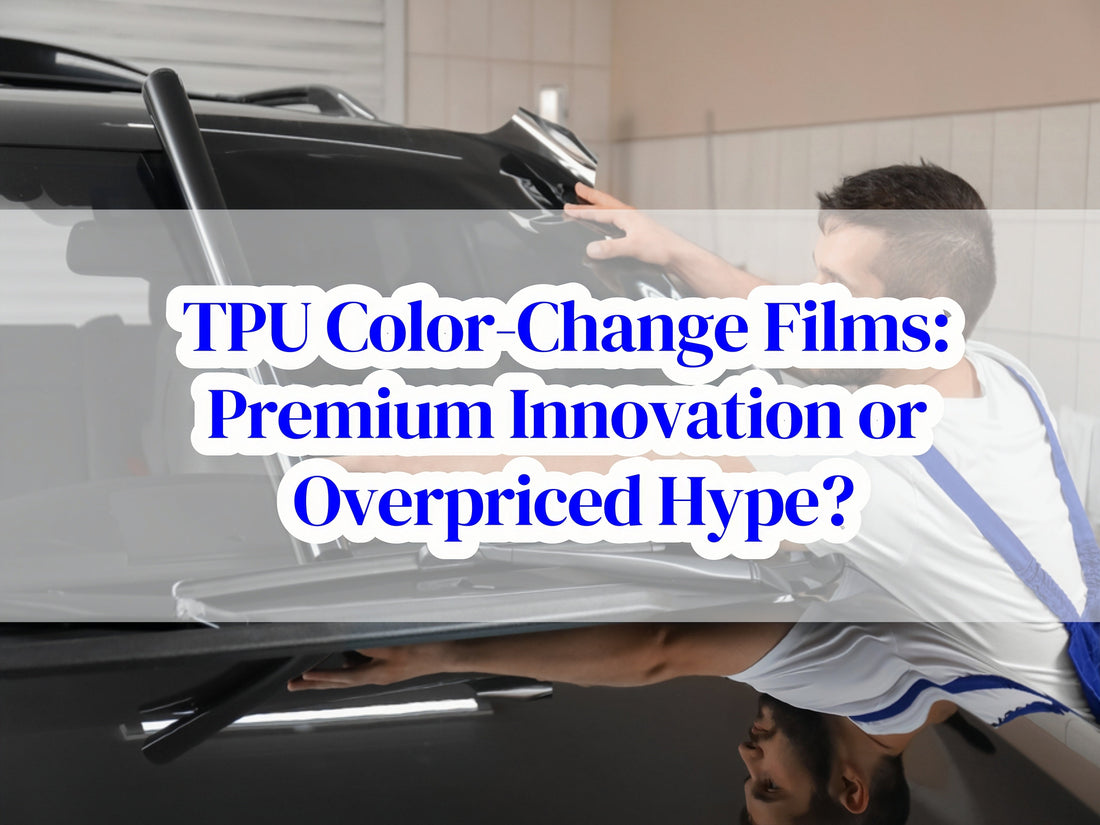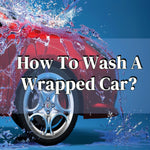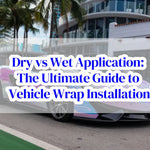
TPU Color-Change Films: Premium Innovation or Overpriced Hype?
This comprehensive analysis examines TPU (Thermoplastic Polyurethane) as an emerging alternative to traditional PVC vehicle wraps. We dissect its technical advantages, cost-value proposition, and real-world performance to answer the critical question: Is TPU a genuine innovation or just marketing hype?
21 August 2025
Share
TPU Color-Change Films: Premium Innovation or Overpriced Hype?
Cutting Through the Marketing Noise on Automotive Wraps' New Contender
TPU 101: Beyond the Buzzword
What is TPU?
TPU is an elastomeric polymer known for:
Key Properties
- Exceptional elasticity (up to 600% elongation)
- High abrasion/tear resistance
- Inherent flexibility at low temperatures
- Strong UV and chemical resistance
Unlike PVC's rigidity requiring plasticizers, TPU's molecular structure naturally balances flexibility and strength. Originally developed for protective films (PPF), its application has expanded to pigmented color-change wraps.
TPU films are typically 6-8 mil thick compared to PVC's 2.5-5 mil, providing enhanced physical protection but potentially softening sharp body lines.
The Premium Promise: TPU's Key Advantages
Self-Healing Properties
The flagship feature. TPU's molecular chains "reflow" when heated (e.g., sunlight, warm water), repairing minor scratches/swirls.
- ✅ Effective against fine scratches (key marks, branch swirls)
- ⚠️ Cannot heal deep cuts or gashes
- ⚠️ Matte finishes heal less visibly than gloss
Superior Conformability
TPU stretches more uniformly than PVC, reducing tension during installation. Complex curves (mirrors, grilles) require less heat, lowering burn risk.
Long-Term Clarity & UV Stability
Premium TPU resists yellowing for 10+ years (vs. PVC's 5-7-year ceiling). Critical for light colors/clear bras.
The "IQ Tax" Arguments: Where Critics Push Back
The Price Premium Paradox
At $4-7/sq.ft (vs. PVC's $2-4), TPU wraps cost ≈70% more. For full sedans, this means $800-$1,500+ extra. Critics question ROI for non-PPF applications.
TPU's opacity challenges:
- Limited metallics/chameleon finishes
- Fewer color options vs. PVC's 200+ choices
- Thicker films may soften sharp body lines
Over-Engineering for Daily Use?
For urban commuters (not off-road/racers), PVC's durability suffices. TPU's extreme protection becomes redundant.
TPU vs. Cast PVC: The Data-Driven Showdown
| Property | TPU Film | Cast PVC Film | Verdict |
|---|---|---|---|
| Tensile Strength | 50-70 MPa | 20-40 MPa | TPU +175% |
| Elongation at Break | 400-600% | 150-250% | TPU +160% |
| Adhesion Strength | 1.5-2.5 N/mm | 1.2-2.0 N/mm | Comparable |
| Thickness | 6-8 mil | 2.5-5 mil | TPU thicker |
| UV Resistance | 10+ years | 5-10 years | TPU advantage |
| Price (per sq.ft) | $$$$ | $$ | PVC cost-efficient |
Who Actually NEEDS TPU? (Spoiler: Not Everyone)
Worth the Investment If:
- You drive in high-debris areas (gravel roads, construction zones)
- Desire scratch-healing without PPF+wrap combo
- Keep vehicles 7+ years and prioritize paint preservation
- Prefer thick, "armored" tactile feel
- Value maximum UV protection for light colors

Stick with PVC If:
- Budget-conscious or leasing short-term
- Love vibrant metallics/unique colors
- Prefer ultra-matte finishes
- Garage-kept with low impact risk
- Frequently change wrap colors
Sustainability: TPU's Underrated Edge
While PVC recycling grows, TPU has advantages:
- Recyclability: Easier to repurpose into industrial products
- Phthalate-Free: No plasticizer migration concerns
- Bio-TPU Options: Emerging plant-based variants (e.g., Covestro's Desmopan® EC)
The Verdict: TPU isn't an "IQ tax" - its technical superiority is proven in labs and real-world tests. However, it's also not universally essential. Choose TPU when maximum paint protection is the priority over aesthetics and the cost premium is justified. For others, high-end PVC remains the intelligent choice.
Prev post

How To Wash A Wrapped Car?
Updated on 22 August 2025
Next post

Dry vs Wet Application: The Ultimate Guide to Vehicle Wrap Installation
Updated on 15 August 2025














